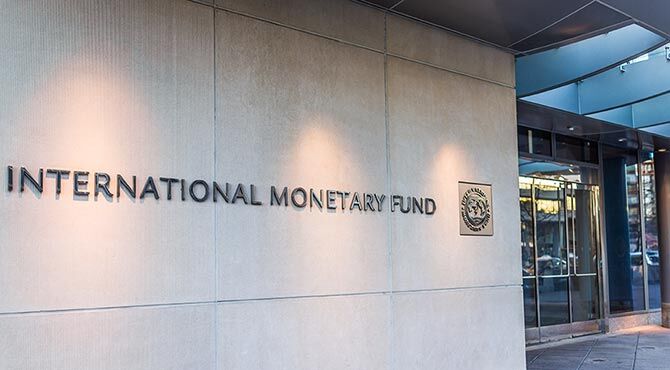IMF: Growth prospects good, at least in the short term
IMG economists urge caution and emphasise that the prospects for growth should not lead to complacency.

 23 January 2018
23 January 2018Upgrading its forecast for world economic growth by 0.2 per cent to 3.9 per cent for this year and 2019, the IMF said: "The revision reflects increased global growth momentum and the expected impact of the recently approved US tax policy changes."The US tax policy changes are expected to stimulate activity, with the short-term impact in the United States mostly driven by the investment response to the corporate income tax cuts."But as IMF chief economist Maury Obstfeld introduced the report at a news conference in Davos, he warned: "The present economic momentum reflects a confluence of factors that is unlikely to last for long."
Global economic recovery not guaranteed
Christine Lagarde, IMF managing director and co-chair of the World Economic Forum this year, emphasised that the prospects for growth should not lead to complacency. "Global growth has been accelerating since 2016 and all signs point to a continuous strengthening of that growth this year and next year," she said, adding there were three key reasons why the recovery was not assured."First of all, there are still too many people who are left out of that recovery and acceleration of growth," she said. "In fact, about one fifth of emerging and developing countries saw their per capita income decline in 2017."The second reason is that this is clearly a mostly cyclical recovery and, absent continuous reforms, the fundamental forces that had us so worried about this new mediocre that we feared, in other words, the scars from the crisis — the low productivity, the ageing population and future potential growth — all of that will continue to weigh on medium-term prospects."The third reason she cited was a build-up of "potentially serious financial sector vulnerabilities" and that there had been a "troubling" increase in debt across many countries.Related articles:Solving the productivity puzzle in the UKUK workers 'lose 11 days a year to IT issues'Mobility as an engine of economic growth
Lower corporate tax rates spur growth in the US - while Brexit continues to effect UK fortunes
The IMF predicted US growth would accelerate to 2.7 per cent this year, spurred by increased investment as businesses take advantage of lower corporate tax rates, which are being cut from 35 per cent to 21 per cent.Eurozone growth is estimated at 2.2 per cent in 2018 but only 1.5 per cent in the UK both this year and next, mainly as a result of the uncertainty over Britain's departure from the European Union.This uncertainty was acknowledged by Chancellor of the Exchequer Philip Hammond when he attended an EU finance ministers' meeting in Brussels on Tuesday. "Because of the negotiations that are going on there's a degree of uncertainty about our future direction and our future arrangements for trading with our European partners and that's bound to have an impact on thinking about the economy," he told reporters."The sooner we can generate certainty, the better, and that's why we are keen to build on the momentum that we generated in December and get the negotiations moving forward now in a steady way so that we can see real progress over the course of the coming months."A spokesman for Prime Minister Theresa May said: "What you can see from the forecast figures is that the fundamentals of our economy are strong and we are delivering a near record number of jobs."Equally, the government has been clear that we are not complacent in confronting the challenges facing the economy, such as improving productivity."
UK employment grows - but skills shortages are a problem
According to the latest Confederation of British Industry's (CBI) Industrial Trends Survey, published on Tuesday, manufacturing growth accelerated over the past three months."The survey of 369 manufacturers revealed that optimism about both business conditions and export prospects improved at an above-average pace," said the CBI."Growth in manufacturing output and domestic and export orders all picked up, compared with the previous three-month period. Stocks also continued to grow robustly: for example, inventories of finished goods stocks rose at the fastest pace since October 2013."Investment intentions for both buildings and plant & machinery moved back above average after deteriorating in the previous quarter, while spending on innovation is expected to continue to increase at a robust pace in the year ahead."Employment grew at the fastest pace since July 2014 over the last three months, with further growth expected next quarter. However, skill shortages are high on firms’ agendas, with the number of firms citing skilled labour as a factor likely to limit output over the next three months the highest for more than four decades."
For related news and features, visit our Enterprise section. Look out for the launch of 2018’s Relocate Awards, entry is now open. Relocate’s new Global Mobility Toolkit provides free information, practical advice and support for HR, global mobility managers and global teams operating overseas.
 Access hundreds of global services and suppliers in our Online Directory
Access hundreds of global services and suppliers in our Online Directory
©2025 Re:locate magazine, published by Profile Locations, Spray Hill, Hastings Road, Lamberhurst, Kent TN3 8JB. All rights reserved. This publication (or any part thereof) may not be reproduced in any form without the prior written permission of Profile Locations. Profile Locations accepts no liability for the accuracy of the contents or any opinions expressed herein.









































